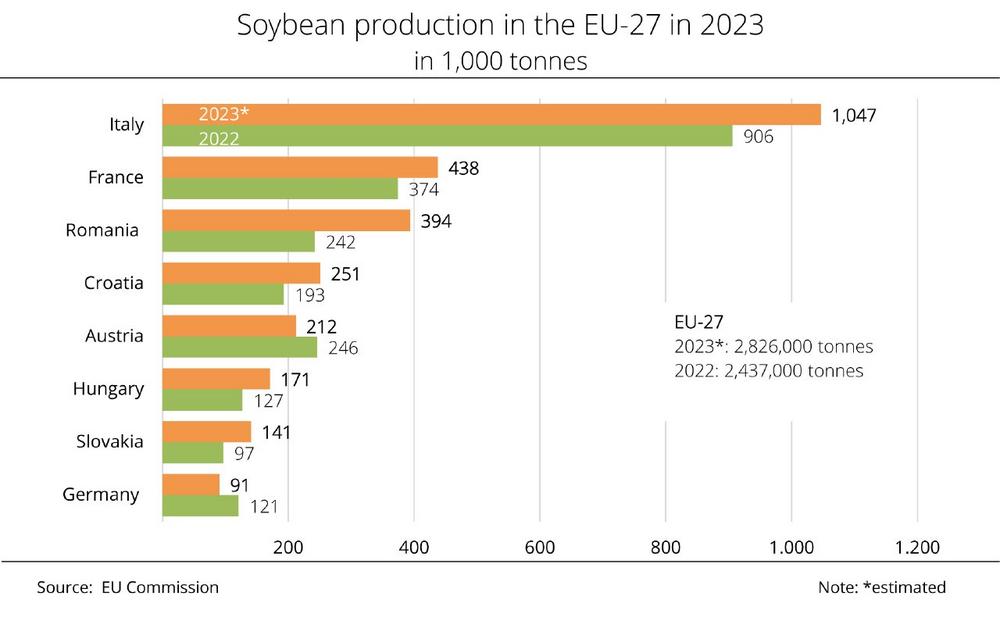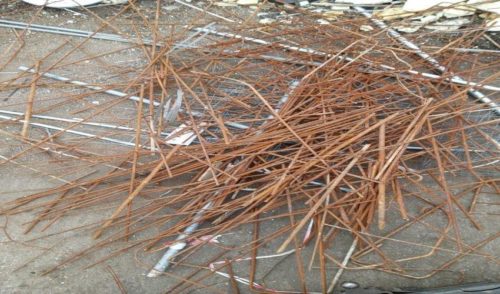
2023 EU soybean output set to increase year-on-year
The soybean output of the European Union more than tripled over the past ten years. According to latest information from the EU Commission, the 2023 soybean harvest is expected at around 2.8 million tonnes, just under 16 per cent more than 2022. In other words, the European Union is set to see the largest soybean crop in six years. Italy is seen to remain the largest producer within the EU in 2023, with just over 1 million tonnes currently projected. This would translate to a 15.6 per cent rise year-on-year. The Commission also expects other member states‘ soy supply to exceed the previous year’s level. France, the second largest EU supplier, is projected to see a 17 per cent increase to 438,000 tonnes. Romania’s harvest, which is currently forecast at 394.000 tonnes, will probably rise even more strongly, by 63 per cent compared to 2022. Production in Croatia and Hungary is forecast to reach 251,000 tonnes and 171,000 tonnes respectively, which translates to an increase of 30 per cent and 35 per cent respectively.
By contrast, producers in Germany will probably harvest around 24.8 per cent less than 2022 – 91,000 tonnes – from a significantly reduced area. Likewise, Austria’s harvest, which is currently forecast at 212,000 tonnes, will probably fall just under 14 per cent short of the previous year’s level.
According to investigations conducted by Agrarmarkt Informations-Gesellschaft (mbH), the main reason for the EU-27’s larger overall soybean supply is expected higher yields, since at 994,000 hectares, the soybean area will be 98,000 hectares smaller than in 2022.
The Union zur Förderung von Oel- und Proteinpflanzen (UFOP) has ascribed the decline in German production area to the 2021 level to the positive price development of other crops, such as wheat, at the time of last year’s sowings. The association has pointed out that for the purposes of climate change mitigation and biodiversity conservation there is a need for early and reliable price incentives through forward contracts for all grain legume crops. According to the UFOP, such incentives are necessary in order to consolidate and further develop regional supply chains. The association holds that for the time being, they should be provided by area-based support during the development phase of the protein strategy, which support would need to be complemented by measures to promote product and hence value-added development. With a view to climate change, the UFOP has emphasised the need for considerable investment in crop breeding in order to sustainably establish these value chains. The new breeding techniques such as CRISPR/Cas could go a long way towards this aim. The association has suggested that it is now up to the EU Commission to propose a new regulation.
The Union for the Promotion of Oil and Protein Plants e. V. (UFOP) represents the political interests of companies, associations and institutions involved in the production, processing and marketing of domestic oil and protein plants in national and international bodies. UFOP supports research to optimise agricultural production and for the development of new recycling opportunities in the food, non-food and feed sectors. UFOP public relations aim to promote the marketing of domestic oil and protein plant end products.
UFOP – Union zur Förderung von Oel- und Proteinpflanzen e.V.
Claire-Waldoff-Str. 7
10117 Berlin
Telefon: +49 (30) 2359799-40
Telefax: +49 (30) 2359799-99
http://www.ufop.de
UFOP e. V.
Telefon: +49 (30) 31904-215
Fax: +49 (30) 31904-485
E-Mail: d.bockey@ufop.de
![]()




